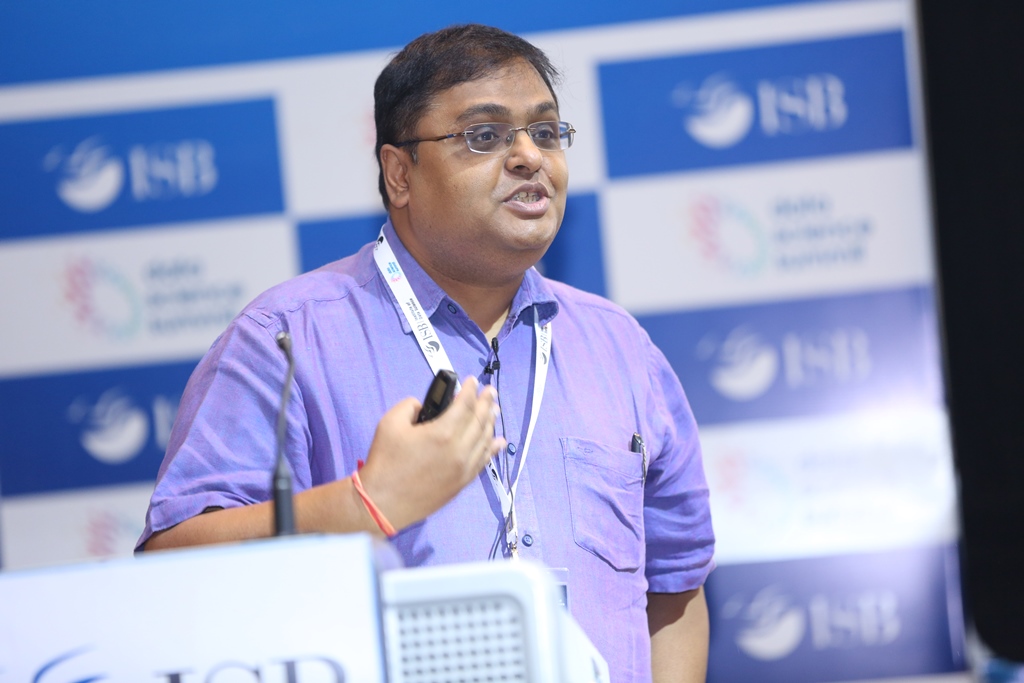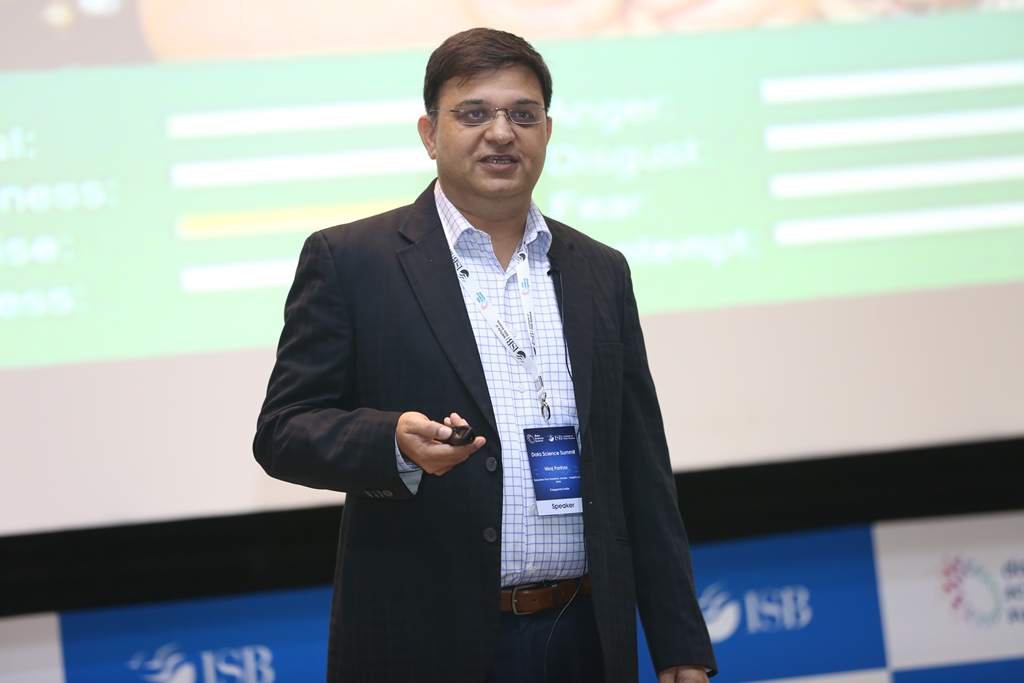Data Science has become an indispensable skill for organisations that are on by the pursuit to integrate meticulous decision-making into their everyday activities. Newly developed Artificial Intelligence (AI) capabilities and the daily influx of large swathes of data have transformed various industries. The ISB Institute of Data Science organised the annual Data Science Summit 2019 on November 29, with a focus on the applicational challenges of AI and Machine Learning (ML) models in retail marketing, fintech and healthcare areas. The speakers included researchers, data scientists, developers from the industry and the academic world. Participants engaged in interactive panel discussions on the impact of AI on retail, healthcare, fintech, data privacy and governance.
Three keynote addresses by top executives from fintech, healthcare and information technology marked the beginning of the summit. In the first session, V Laxmikanth, Managing Director of Broadridge India, spoke about the challenging terrain of decision-making when there is an abundance of data. He emphasised on the paradox of the materialistically imperfect nature of the AI machinery and the nearly perfect decision-making that it can develop. He highlighted the need for a responsible deployment of AI through careful management to prevent unintentional yet significant damage to the business, the employees and the society as a whole.

Dr Sujoy Kar, Chief Medical Information Officer and Vice President at Apollo Hospitals spoke on the use of AI and ML in Bedside Care. By delineating the use of AI and analytics for healthcare, Kar pointed out the challenges that arise in the application of ML in delivering various services. Even as the accuracy of Neural Networks in healthcare analytics in high, there is a problem of interpretability of the data which is yet to reach a reasonable stage. Trust and safety are the key parameters to building strong prediction models in the industry. ML prediction models currently fail to make predictions across varied sets of populations and hence, there is a need to work on the recalibration of existing models in such cases. Alluding to the legal provisions for health data privacy, Kar suggested that “if data cannot travel across boundaries, analytics has to.”

Even as AI makes remarkable strides from aiding in efficiency to saving lives in emergencies, its capabilities fall short in assisting humans in complex activities involving human awareness and empathy. This creates the conditions for the development of Emotional Intelligence (EI). In his keynote session, Niraj Parihar—Executive Vice President and Leader of Insights and Data at Capgemini India—spoke on the rise of EI in the age of AI. Parihar outlined the areas in which organisations could develop and adapt EI capabilities—use of technology, customised learning programmes, rewarding talent, employee feedback and Corporate Social Responsibility (CSR). He opined that EI would have a higher impact in the Indian market for insurance, retail banking and automotive sectors. “Heart hunting in addition to head hunting” is critical to successful organisations, he added.
The day continued with a speaker session by Aashish Chandra, Global Head of Technology at Tata Consultancy Services, in which he explained how AI has revolutionised retail by improving inventory management and preventing organised crime in stores. During the panel discussion on AI in retail moderated by Sudhir Voleti, Associate Professor in Marketing, and Associate Dean at ISB, the question of AI’s relevance in unorganised retail was floated. Responding to this, Dharmender Khanna, Head of Retail and Omnichannel at SSIPL, said that the need for a human touch in retail stores relates to the importance of building a relationship of trust with the customers. The absence of a human touch may impact negatively on the brand loyalty. The panel acknowledged that machines could not completely replace the tasks that store managers have been carrying out thus far. Nitin Sareen of the Aditya Birla Group expressed his scepticism about ML being a replacement to common sense. According to him, analytics can be put to good use in determining store locations, price shifts and understanding the interconnectedness in the distribution cycle.
The second half of the summit began with a talk by Ajit Narayanan, CTO at mfine, on the practical use of AI in healthcare to help doctors in the process of diagnosis. Lack of access and lower standards in healthcare, along with changes in lifestyles, have made the traditional systems of healthcare less effective. Providing healthcare to patients virtually with the use of right data and AI tools like chatbots is a “step towards providing quick access to quality healthcare for India,” Narayanan expressed. The talk was followed by a panel discussion, “The Future of the Healthcare Industry: Emerging New Paradigms using Disruptive Technologies”. Professor Subodha Kumar from Fox School of Business at Temple University moderated the discussion on the impact of modern solutions to healthcare such as virtual reality therapies, chatbots and health data analytics. The panellists agreed that there is vast potential in disruptive healthcare delivery models with the availability of substantial data. But at the same time one needs to reflect upon the challenges in developing them in a diverse market like India. Abhay Shukla, Senior Director, Advance Analytics Solutions at Optum Global Solutions, acknowledged that there is a need for checks in health data analytics in the current technological environment. While AI and ML algorithms are saving the time spent to treat a patient, they are only used as guidance mechanisms and not for final decision-making.
Speaking on the use of AI in the Fintech industry, Anish Agarwal, Director of Data and Analytics at Royal Bank of Scotland, explained how the financial sector is developing sentiment analytics, product testing, asset management, regulatory compliance and fraud detection to help the banks to concentrate on their core offerings. A panel discussion moderated by Prachi Deuskar, Assistant Professor in Finance at ISB, deliberated on this theme. The panellists discussed the impact that AI has had on the lending business, insurance space, digital payments, retail and asset management.
Following the discussions on the impact of AI in retail, healthcare and fintech, a speaker session and panel discussion were held on the issue of privacy in the era of Artificial Intelligence. Deepak Maheshwari, Director of Government Affairs at NortonLifeLock, spoke on the need for deeper understanding of the intricacies of personal and non-personal data protection laws at the local level. In the session that followed, Madhu Viswanathan, Assistant Professor of Marketing at ISB, moderated a panel on the “Impact of Privacy Regulations on Digital Growth”. Panellists discussed the origin of risk when sharing data with various entities. During this session Jayaraman Pazhamalai, Senior Vice President at ReBIT, remarked: “Now is the time when security and data are converging. Risk comes from doing what you do not know. Organisations must carefully manage and understand privacy regulations with third parties as accountability cannot be outsourced.” Addressing AI developers, Kartik Shinde, Partner at E & Y added, “the companies which develop the AI algorithms should identify the privacy loopholes and take measures to fix them as part of their framework.”
The last talk of the summit was given by Shailesh Kumar, Chief Data Scientist, CoE AI/ML at Jio, titled “From Data to Intelligence: Evolution in AI Thinking”. Kumar brought to the attention of the audience the inevitable journey that any organisation takes towards developing AI capabilities. This demands the need for organisations to make a shift from an Information Technology (IT) mindset to an AI mindset. Kumar urged entrepreneurs and researchers to focus on the much-needed sectors where AI can make significant contributions in India. The summit was concluded with a networking dinner where participants and speakers interacted.
About the Writer:
Ram Mohan Chitta is a Research Editor for ISBInsight at Centre for Learning and Management Practice, ISB.








